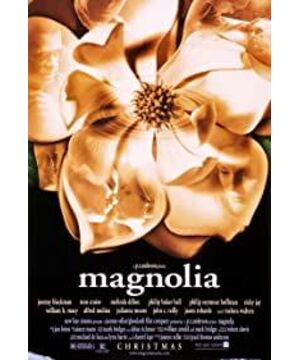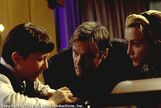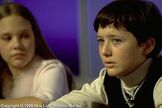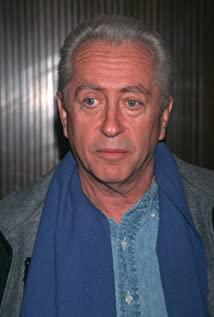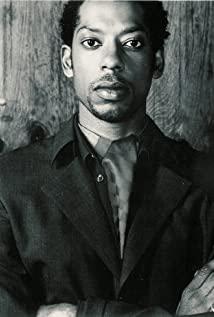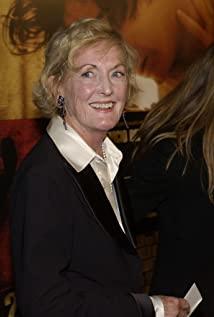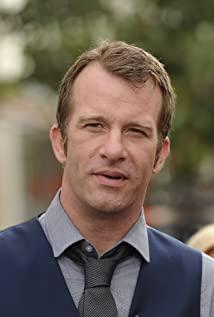If there is no rain of frogs
-Try to comment on PT Anderson's "Magnolia"
MG1336003 Chenxy nju.cn
[Two parts]
"Magnolia" is a full- fledged movie. If we are willing to jump off the general audience and watch the movie, we will ask for "enter the play" , And then sigh for the misunderstanding of the world’s favors, and analyze or guess the director’s production, then first of all, the three-hour length can be divided into two parts: the
title: 5 minutes, 3 events: tabloid anecdotes that have nothing to do with the subject, extremely It happened by accident; the
main body: 175 minutes, 9 main characters, countless events, conflicts, and ended in a catastrophic frog rain.
This set of comparisons alone can lead to many interpretations of the "Keyword A. vs. Keyword B" format: (1) Accidental vs. Necessity; (2) Necessity vs. Miracle... In the existing "Magnolia" In many film reviews of ", there is no lack of this approach. Inspired by this, I can roughly draw the following comparison:
(1) Accident = coincidence = events happen at the same time, inevitable = doomed = event will eventually occur, when the interval of time Squeezed to the extreme, all events are concentrated at one point, and its outbreak is bound to become accidental;
(2) But this outbreak, realized in the movie, is an impossible rain of frogs, torrentially down, like a doomsday, overwhelming the sky, — overwhelming the inevitable trajectory of everyone that night, and causing the thief to fall. Let those who commit suicide with guns fail, reunite mothers and daughters who have not communicated with each other, rescue those who committed suicide by taking drugs, and make the desperate police "picked up" the failed thieves and took care of them, reborn both of them, and rushed to bed. In front of the dying father who regretted abandoning his wife and abandoning his son, the former son finally broke his vow not to cry The furious competition prodigy finally dared to ask his father to be kind... But if we are willing to regard this impossible rain as a setting in the script, rather than a rhetorical or metaphor (such as the frog seen in many film reviews) Rain = "Old Testament Exodus" 8.2: "If you refuse to let them go, I will make frogs ruin your surroundings." So I kept pressing the back button to find details about the numbers 8 and 2 from the film) :
Then this setting is indispensable for the film. It is the extreme of the contrast between accidental vs. inevitable: the former, accidental vs. inevitable, can happen in life, such as the three accidental events in the opening; but the latter , The frog rain that rescued everyone, only appeared in the movie. Or to put it another way: (1) accident is an inevitable deficiency; (2) miracles are an inevitable double.
[Three Parts]
If this interpretation is desirable, then it should be further revised and divided into three parts:
opening title: 5 minutes, 3 events: accidental, extremely accidental, but it happened;
main body: 160 minutes, 9 main characters, Numerous events and conflicts ended in a catastrophic frog rain.
Ending credit: 15 minutes, 9 characters, restore peace of life and soul.
So, at this moment, you will notice that the original ending, although viewed from the picture, still continues the main body; but from the perspective of its narrative (the voiceover returns to the narrator’s monologue), the ending is actually closer to and more echoing the opening.
Therefore, if the whole subject, which at first glance, seems to be intensive and unsolvable, is regarded as a mystery, then the opening is the mystery, and the ending is the answer. We don’t need to bother to find details about 8 and 2 in the main body, although it is indeed meaningful to the language of the film and its fans;-we only need to compare the voice-over at the beginning of the film with that at the end:
Title: (After narrating 3 accidental events) In my humble opinion, this is not an ordinary thing. This is not something that happens all the time, please, it's fundamentally different. This is not just about fate, this kind of evil has never stopped.
End credit: Back to those three accidental events (playback), countless such stories, full of coincidences and accidents, all kinds of intersections and weirdness, who can predict such and such stories? And usually we say: "Damn, that kind of thing is only in the movie, I don't believe it. How so and so, met so and such stories..." In my opinion, such an anecdote In fact, it happens every day, and the days just pass by day by day, and the days go by like this. There is a saying in the book: "We may be through with the past, but the past ain't through with us." (We may be through with the past, but the past ain't through with us.)
Ending-opening title = "Although time has changed, we will not change." "
[Mystery]
Obviously, this is the answer. We may be through with the past, but the past ain't through with us. It
corresponds to the biggest mystery in the mystery: frog rain.
At this time, go to see the
Scriptures of Frog Rain: "Old Testament Exodus" 8.2: "
If you refuse to let them go, I will make frogs ruin your surroundings." If you refuse to let them go, I will send a plague of frogs on your whole country.
What is "them" here? ——“The past.”
So, it is logical that this movie can be understood, that is, it can be understood by the daily experience of ordinary audiences:
This movie is about how individuals face their own past and how they relate to themselves. The forced past (tragic memories) reached an understanding; how individuals faced each other, how the imposing person and the imposing person faced each other and obtained understanding; how the whole world "let them go".
When no one would allow "them" to go, tortured by the memories, pain, and nightmare, tortured each other, and repaying each other endlessly, the heavy rain finally fell from the sky, ruining the surroundings.
The answer is: refuse to let them go.
So, how to "let them go"? If you think of refuse to let them go as a puzzle, then where is the answer, let them go? How to let them go?
I'm afraid it still returns to the mystery: the main body of 165 minutes.
[Listen, just listen] The
first time the Pian'er police went out to police, - in fact, the police went out every time, they were almost the same as this time. They dealt with complaints of "neighbors are noisy every day". - This time the police went out to deal with a black woman. But this time she was the only one, and there was no big quarrel, but she hysterically told him to go away, strange. Finally he found that in the closet, a male corpse. Later, criminal police, forensic doctors, and a large force came to inspect the scene, interrogate the suspect, and perform routine duties. The policeman in Pian'er was finally busy. When he got on the car and was about to leave, he kept following a little black boy: the neighbor of the black woman, the informant of the police, and the police must listen to him: I can help you solve the case. I can tell you who did it.
If we were mindful, the third of the three accidental events at the beginning of the film will be replayed: the 16-year-old boy has despaired of his parents’ daily intimidation of noisy, and fell from the top of the building to commit suicide. He would not have died: 3 days ago, the second floor. A safety net just opened. But after he jumped down, when he fell through the window on the 6th floor, a gun shot a bullet from it, just hitting his chest. The one who pulled the trigger was the old wife holding a gun to scare her husband, and the boy's mother. However, this shouldn’t have been done: the old wife thought it was an empty gun, and secretly loaded the bullet, it was the desperate boy: he would rather one of his parents break the other down, and the quarrel would be over from then on Calm down. —— But this inside story was told to the police by a little boy in the corridor. He was the boy's little playmate, and the boy had confided to him pain and secrets.
Back to the black woman's closet, the man's corpse in the closet: her husband. Is there the same coincidence in this murder case? Or is it that the black woman is not a murderer, but a man who does it but loses his hand and takes his own life, but the black woman cannot convince others to believe this, so he has to hide the body in place?
Fortunately, the screenwriter is not so petty and content with coincidences. That's the level of "Bao Gongan" and others: coincidence manifests itself, and the real culprit can be seen according to the light. Pian'er Jing is a rare good-tempered, and patiently listens to the little black boy and sings his rap. But when the little black boy finished raping and singing seriously, the policeman drove away and said, "I don't understand what you said, go to school, boy", leaving the little black boy shouting: "I told you who did it, and you' re not even listening to me."
If this is still inexplicable, you might as well take another clip: a
dying old man who abandoned his wife and son when he was young, and later married his sweet wife. Now he is dying in bed, and his sweet wife can finally inherit the inheritance, but life is worse than death: she suddenly finds that she is reluctant to bear him, sorry for him, fooling around for half a lifetime, deceived him for a lifetime, unworthy and no longer want to inherit his inheritance. She was haggard, taking drugs, seizures, and hysterical, and went to a lawyer, hoping to change his will, so she didn't want any more. But the lawyer did not understand and did not help. She collapsed, exploded, slammed the door and left.
She tried to tell her sins and regrets, but the lawyer only replied in legal terms. She was still cautious not to comment on the private affairs and heart of the owner, keeping her distance; however, what the owner needs at this time is a momentary embrace so that she can live. Go down; not the distance to meet in the future: whether there will be any future is a question. But he didn't give it.
Back to the little black boy: it doesn't matter what he wants to say, what matters is whether the other party is listening. Whether to listen attentively.
How much need do you want to listen to? Let’s look at another boy: being pressured by his father and tricked by the TV industry, he became a prodigy and celebrity in a quiz. However, he is also embarking on the tragedy of an autistic freak and unable to communicate freely with his peers. Stanley: He held back urine while trying to answer on the TV scene. In the gap, he told the staff over and over again: I need to go to the toilet. I need to go to the toilet. I can't support it anymore, I want to go to the toilet.
But the other party didn't listen at all. At most, he said: It will be fine later. But wait a while, wait a moment, a moment is endless. He finally peeed his pants. The shock of humiliation made him lost and confused, and he never answered questions again. When the host was surprised and the backstage threatened, he turned from shame to anger: I just don't want to answer questions, I just don't want to be a child prodigy, a freak, and a tragedy! Damn you, you all go to die!
He exposed a model, an industry, and hundreds of millions of viewers. From the perspective of the movie, the plot is here, and only the frog rain can end.
If we use a little bit of movie language association, then we can understand "going to the toilet" as a metaphor: to speak our memories, release our pain, and return to the one that does not hold back the urine, does not lose shape, and does not suffer. Life.
Listen, just listen.
【But it did happen】
If you think of such an analogy, you can make the best of it, I’m afraid it’s not necessarily. The movie is not a fable after all, it is just like persuading the world: speak it out, listen to it, and we can all return to tranquility. Look at another example:
Competition anchor Jimmy found out that he had cancer and went to his daughter Claudi to tell him, but he was scolded and kicked out of the house. In this double pain, he was still hosting the show: the final battle of the competition, but the child prodigy peeed his pants, and he too Fell to the ground. The program team sent him home. In front of his wife, the dying tired and uneasy, he finally confided the secret, but the wife left in pain.
So he moved his body with difficulty, drew out a drawer from the table, drew out a pistol, and prepared to commit suicide.
He said it, but was not forgiven.
Because the wife rushed to her daughter. He is only the imposing person, and the daughter is the imposing person. His daughter has been assaulted by him and has since left home to live alone and banished herself from drugs. In the heavy rain of frogs, the mother finally rushed to her daughter, found her shivering daughter, and hugged them together. "It's okay, It's gonna be all right." Mom said.
At this time, the camera moved up and moved to the daughter's painting: a small note was
pasted at the bottom of the screen: But it did happen. On the
screen, three young girls were sitting together brightly under the tree, but in the close shot, there was another girl. , Tuoyi meditated: But it did happen. It was my daughter's painting. It was the voice that she could not escape from the subconscious mind.
[From tip to rap]
If the sentence "But it did happen" can be highlighted from the main body of the story, and then separated, separated into a text higher than the story, and viewed as the password to understand the story, then in fact, in Before this little note, there had been a much larger appearance with the impatient little boy at the Pian'er Police Station.
We went back to the rap that the little black boy insisted the police to listen to and carefully recorded the "lyrics":
…… ……
Try to listen and learn,
Check that ego. Come off it.
I'm the prophet, the professor,
I'm gonna teach you about the Worm
Who eventually turned to catch wreck
With the neck of a long-time oppressor.
And he's running from the devil,
But the debt is always gaining.
And if he's worth being hurt He's worth bringing pain in
When the sunshine don't work The good Lord bring the rain in,
first look at the first sentence: Try to listen and learn. This sentence is very eye-catching. It is already the theme I got after solving the puzzle.
Next up:
Check out that ego (proud) and step over it.
I am a prophet, I am a teacher, and
I want to teach you about that bug,
which finally broke the
neck of the oppressor for many years.
It avoided the devil,
but the scars kept growing.
If it is worthy of being hurt, it is worth the pain/worth the effort.
When the sun no longer bathes people, the Lord will pour a heavy rain.
My translation method is not completely accurate, because individual words and sentences are actually deliberately seeking double ambiguity: And if he's worth being hurt, he's worth bringing pain in. In the second half of this sentence, what is the meaning of bringing pain in? Literally, it can be straightforwardly understood as "worth the pain": if the injury is worth it, then it is also worth the pain. Therefore, the characters in the film are all entangled and tortured by past memories, pains, and nightmares, and cannot be exported. But if you go deeper, take the rhetorical meaning, and relate it to the meaning of pain in "No pain, no gain": hard work, then this sentence can be understood as: If (the other party) is worthy of you so you hurt, then he It is worth your hard work (to redeem your sins).
It is also worth noting that the word "worm", the most common metaphor in Western literature, is to bite the deep pain, hatred, and heart knots of the soul.
If we have already interpreted some imagery from "figures"/"meanings", we might as well look back at Frog Rain:
[If there is no Frog Rain]
Audiences who are slightly familiar with the Western context will have the experience: disaster, in In the Western tradition since the "Bible", it not only represents destruction, but also represents a break, represents a break, represents a new life, represents the cleansing of the old evil in the sky (Sodom), and represents the fierce species in the huge waves. The exhaustion (the great flood) represents the will of Jehovah, and represents the Lord's ultimate intervention and care for the world. If the fullness of evil guanxi cannot be eliminated, then the world will not live in peace, nor is it worthy to live in peace.
From this point of view, the depth and intention of this movie's practical classics are still not beyond the mainstream public: the evils of the world have been restored, the will of God has been restored, and the carbuncle has finally been resolved and redeemed.
As an audience outside of the West, an audience who is only accustomed to only privately imparting to the good, the wicked, and the lovers by God’s will, and in short, can’t help but ask: What if there is no frog rain?
This question involves at least two levels:
(1) For the film itself, if the allusion of frog rain cannot be borrowed, how does the script end?
(2) For the human world shown in the movie, it is true that the frog rain is a zero-probability event: this kind of human world should be destroyed step by step, without solution and redemption?
Let’s try to answer (2) first:
[Police and carers]
If you only focus on the nine pains and shadows in the film that are entangled in the past, it’s easy to ignore the people who are unable to rest in the moment. These two roles: Pian'er policeman and male nurse.
If you say more, these two roles are actually quite ironic: the policeman is a symbol of authority and force, but he is just a small policeman, low-level and trivial, like the aunt of the neighborhood committee. The caregiver is a symbol of motherhood and hygiene, but he is a male caregiver, dull and mediocre. In fact, in the first time watching the movie, this layer of processing also achieved the goal: to weaken the gap that should be different from other characters.
Why is it weakened? Because this gap, or difference, is a deliberate setting, of course, it must be appropriately hidden: the policeman asks black women and asks drug users. The persistence is close to chattering, which is annoying, but what he is obsessed with is the exclusion of the police. A function/role setting that harms and protects peace; but even so, when the gun was thrown away in a strange way when the police last time, he immediately lost his soul and cried like a lost child. In the same way, the caregiver has always been kind to the dying old man and listened very religiously, even if the old man is already struggling to utter a word; but when the old man finally missed the name of the son he abandoned decades ago, he tried to get in touch with him like a demon. This son, repeatedly beating this son, has now become a celebrity consultation hotline for the masters of picking up girls, telling me that there is a dying patient here... The babbling makes the other party repeatedly ask, why on earth are you calling me...
But the credits, frog rain Later, the police rescued the former quiz prodigy, today’s loser, and the thief (he was fired because of poor communication and failed to promote electrical appliances. In order to retaliate against his employer, he gave a little IQ and sneaked into the office to steal all the money; however, he recovered. After being sensible, he decided to return the money again. The police caught a glimpse of him when he climbed the wall and broke the window, but at this time the heavy rain hit him and knocked him off the wall.) After that, he took him home. The next day, he returned to peace and chatting. There is this sentence:
"Most people think that I'm just finishing work, finishing a meal in one meal, and so on. But I treat it as my life, with no retreat. What everyone can't imagine is... Seriously doing it right How much effort is needed for one thing."
Just like the phrase "I'm the prophet, the professor" in the rap of the little black boy, it implies that in addition to his own role, the little black boy also acts as a "prophet" that predicts the rain of frogs. In fact, The film police here also acts as another role in addition to its own role,-the answerer, or the redeemer:-(
2) For the human world shown in the movie, it is true that the frog rain is a zero-probability event: Should this kind of world go to destruction step by step, without solution and redemption?
—— "Most people think that I am just finishing my work and finishing a meal, and so on. But I regard it as my life and there is no retreat. What everyone can't imagine is... Seriously How much effort is needed to do one thing right.”
Looking back at the caregiver:
If you put the policeman back in his role, you will also see that the nine characters in the film are actually entangled in two family networks:
(1) A. TV game show prodigy Stanley (A), between the school and the studio bustle;
B. contest anchor Jimmy (B) found suffering from cancer, to visit her daughter Claudia (C) complained that he was cursed by
the door refused In addition;
C. Claudia, the daughter of Jimmy (B) and his wife Roth (D), struggles with drugs and promiscuity;
E. Donnie (E), a former contest prodigy, is now socially disabled and is trying to be accepted as an electrical salesman. But still
entangled in the glory/nightmare of the old days;
(2) F. Contest producer Earl (F) is dying in bed, with a caregiver Phil (G) by his side, and a sweet wife Linda (H)
rushes to buy medicine for him, but what he keeps thinking about is different. One name: Frank (I);
I. The master of picking up girls and the handsome man Frank (I) are very energetic on stage, teaching many dry men how to masculine
charm, playing with women in their hands, but in-depth interview shows behind the stage , the hostess of the chase for his childhood
asked quoted by hostile silence;
we can see that the police are involved in the home network (1) being: he was a neighbor complained of noise, check Claudia (C) apartment, see Why did she turn on the sound to be noisy, and asked her why she was in a bad mood, and finally got the courage to want to date her; the date happened when he lost his gun and was in despair, but he chose to speak out and face her frankly; the frogs were overwhelming. In the heavy rain, he also saved Donnie (E) who was in danger.
What about the caregiver? The nursing worker is involved in the family network (2): he comforts Earl (F), and he has the piety to help out with his last thoughts on his deathbed. The abandoned son, who might not be willing to recognize each other even if he was in contact, retrieved it... Finally found it back. He witnessed the deep pain of Frank (I) finally released, and also witnessed the old man finally passing away, though not smiling. , But the sinner can die with peace of mind if he releases his guilt and regret; the old man died in the rain, and on the new second day, he also facilitated the misunderstanding between Linda (H) and Frank (I).
If this interpretation is not wishful thinking, then the answer to question (2) above can have more weight:
——(2) For the human world presented in the movie, it is true that the frog rain is a zero probability event: this Should the human world go to destruction step by step like this, with no solution and no salvation?
——There are also police officers and paramedics. There is strength and tenderness in the world.
[Back to the script]
Let us put an end to this interpretation of the gradual flood of emotions in due course and return to the script.
If you agree that the police vs. the carer is a set of confrontations, then there are more than one set of confrontations in the character setting of the script:
(1) Little Black Kid vs. TV Prodigy: They all said something like "I'm the prophet" then all prophets;
(2) television prodigy vs. former TV child prodigy, today failed salesman: today and tomorrow, yesterday and today;
(3) television prodigy vs. Paoniu guru: the media portrayed as a non-self , A fake
self created by the media; (4) A dying old man vs. an unfaithful wife: It was only at the last moment that he realized his regret, but it was too late to come back;
(5) Drug-addicted daughter vs. picking up girls Master Xue: They are all hurt by their fathers. The former relies on their mothers to return, while the latter has lost their mothers;
(6) TV anchors vs. unfaithful wives: The people they hurt or jeopardized (daughters, husbands) are still alive, but unable to
Speak face-to-face, you can only talk to a third party (wife, lawyer);
…… ……
Although the confrontation is so rich, it is not worth praising how exquisite the script is. Linglong scripts that leave no trace are just plastic. In fact, the whole movie must be after the dust settles, and I slowly recalled that I noticed these confrontations. In watching the movie, the deepest feeling is the narrative clues of the 9 characters that are completely irrelevant. They switch instantly, just like a live broadcast. , The live broadcast of tracking shooting, the camera is not quiet, and the switch leaves no room for reaction, which can be called bloody.
Since it talks about the "live-broadcast feeling", then this film is indeed narrative, challenging the limit of the film: narrative, acquiescing to the past tense, at most also the past progressive tense: "Things happen like this, listen to me Speak slowly"; this kind of dislocation, contrast and superposition in the tense reflects the memories, expectations and even illusions of the characters, and more of the film language provides convenience, such as montage, such as "Lola Run",-but In contrast to this convenience, "Magnolia" is filled with the whole film, with immediate tension and unforeseen conflicts. There is no distance between the narrator and the characters. It is swept by, the audience can only Struggling to finish.
In fact, the movie not only challenges this boundary, but also teases this boundary. Our caregiver said to himself when trying to contact the son:
"Oh my God, this scene is like in a movie The same..."
If the reader still has the impression at this time, he might as well replay the ending narration:
"Damn, that kind of thing is only in the movie, I don't believe it. How so and so, met so and so, and such stories..." The
director is no longer afraid of "playing out": Although the people in the film do not believe whether they can achieve a film-like turning point in the reality that resembles a movie bridge (find The dying old man never forgets his son, father and son meeting), but still tried so hard; the ending narration recalls these, and tells that in reality, people will sneer at similar things, thinking that only in the movie will there be a turning point and redemption; but in fact, , The narrator continued:
"In my opinion, such anecdotes actually happen every day. "
[Film and Architecture]
As a film review required by an architectural theory course, the original vision of this article is also full of interpretations of related theories by philosophers such as Deleuze, Benjamin, etc., just like similar texts commonly seen. There are not short footnotes attached. But ashamed of their book, I cannot read them for a while. If I forcefully explain and quote them, I will only feel a guilty conscience. Movies, like architecture, are very complex and very autonomous art forms,—— In other words, creative activities are more accurate. I am afraid that this reality requires ordinary people to have a thorough understanding of one activity and work, and then compare it with the other for more discoveries.
Here are only some extremely superficial thoughts:
(1) About metaphors, classics, and traditions:
Frog Rain comes from "Old Testament Exodus" 8.2. In the original text, it is an early warning, an early warning to a lonely person (Pharaoh). The subsequent rain of frogs made the lonely walkers repent and resurrected the world. The whole film is a realistic narrative, only this frog rain, the exception is extremely abrupt. But it was this frog rain that rescued the people who were on the verge of destruction. If you say "allusions", the weight is not too heavy. And this film with the theme of salvation and finally returning to peace is not unconventional.
But this kind of metaphors, classics, and traditions are rooted in the film, rather than forcefully inserted: at least, the feelings of the people in the film are first, and then they step into the metaphors, classics, and traditions, not the other way around. .
However, among the many contemporary Chinese architectures that advertise "Chineseness" and "dialogue with tradition", we usually see the latter in the majority. Needless to say the reason for this.
(2) Multivalence and ambiguity When I
first read the book Meaning in Architecture by Charles Jenks many years ago, I remembered something fresh: the theorist compared the Liverpool Cathedral designed by Sir Giles Gilbert Scott in his home country with the design of Master Le Corbusier. Marseille Apartment: pointed out that each function of the former (such as external identification/symbolism, internal space atmosphere...) must be designed with a single action and an architectural element (such as clock tower, interior decoration) corresponding to it; As for a balcony, it can be clearly distinguished from the outside. From the inside, it is both a balcony and an open-air bar, or a frame for the distant view. Theorists put this kind of cleverness and use one word to describe it:
multivalence.n. [Chemistry, Biology] Multivalence; Multivalence; Multivalence
; Polysemy; Multi-infectiousness.
If we are convinced of this judgment, Looking at the movie in this way, you will agree that the details in "Magnolia" can also be worthy of this multivalence.
This reminds me of another word: ambiguity (ambiguity), which is also a high-frequency vocabulary in architectural reviews. But if you get a deeper understanding of this word, you will find that it has the same prefix as ambulatory (corridor): am-; and ambulatory (ambulance) is more like ambulance: there is reason to guess, am-, or ambul -, has the meaning of "surround" or "walkable". The latter section of ambiguity, bi-, is probably "two", such as bilingual (bilingual) and bicycle (two-wheeled bicycle).
Then it can be said that the meaning of ambiguity is "to be able to move between two meanings", rather than "to be caught in the middle and not to lean on either end". At least, in terms of aesthetics, ambiguity should be both male and female, not male or female.
Take a look at the ambiguity advertised in today's flood of architectural works, smile without saying a word.
Gossiping,
thank you, Teacher Wang, for proposing such a work. Otherwise, with my self-cultivation of watching movies, I am afraid it would be difficult to take the initiative to watch it. And after getting used to the epics that I love (such as "City of Sadness", "The Life of Others (Das Leben der Anderen)"), at first glance at this kind of solemn or solemn movie without epic, it is really a bit disturbing. And when I didn't understand it at first, when I looked at other people's film reviews, it was even more troublesome to talk about things like the frog rain and the allusions in the "Old Testament". I am convinced that, just as I was convinced when looking at architecture, the duty of architecture is design, just as the duty of a movie is to tell stories. If the story itself cannot be explained, then no matter how many allusions, metaphors, and tricks are used, they are all nonsense; film critics also NS.
Therefore, after many days and abandoning the beginning, I tried my best to finish this article.
Thanks to "Magnolia", the three-hour film is worthwhile.
Thank you teacher for taking the time to review.
View more about Magnolia reviews


